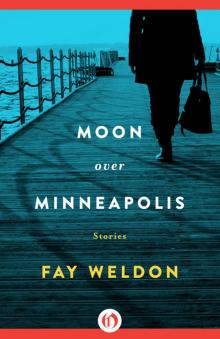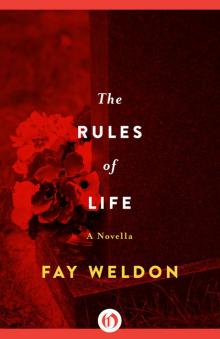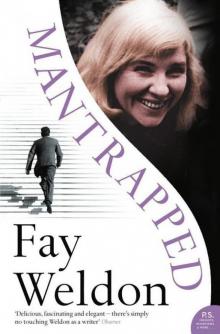- Home
- Fay Weldon
The Bulgari Connection Page 12
The Bulgari Connection Read online
Page 12
Barley was happy to hear from Flora. Sometimes it was pleasant to be reminded of his past calm life with Grace, of the days when Wild Oats was all of a piece and called the Manor House, there was a familiar bed to go to, and the restful contours of a lifelong partner under the blankets. It was not that he had been actively unhappy with Grace, just bored. He had needed a woman with more vitality, more up and go, and had found one in Doris. When he had Grace, of course, he had been able to slip out from time to time to energise himself: now he had Doris he would not dare, but then why would he want to? Doris used up all available sexual energies and even a bit more; he would arrive at his office quite tired and that was not always a good thing. A good mood, yes, but one missed clues, rumours in the wind. Perhaps more sex at night, less in the morning, was the way to keep his edge.
It would be his birthday soon. One was as old as one felt, and he felt pretty young. He had Doris to thank for that. And she didn’t make a fuss of birthdays the way Grace had, unnecessarily emphasising and publicising the passage of the years. Age was something you kept to yourself.
All the same, hearing Flora’s soft voice, he had been vividly reminded of the night they’d all stayed up ghost hunting, with coffee and sandwiches. A sudden happy painful memory. Grace’s soft thigh pressed up against his in the dark, and her whispery laughter, a sudden renewal of sexual interest that surprised him. But without Flora as catalyst it wouldn’t have happened. A marriage that needed a third person around to bring it to life couldn’t be all that good. And shortly after that he appeared on Doris’s show and he and she had got together, and that was that. And Flora had come along to the wedding, and looked very good and cheerful, so he assumed she thought the formalisation of the union was a good thing, and was on his side in the divorce, not that sides needed to be taken, or not until Grace had put herself out of court – or into it, as it happened – trying to mow poor Doris down in the Jaguar, which had shocked and upset her no end. Doris was not as tough as she looked. Grace always had been a rotten driver: couldn’t even drive straight enough to get Doris. Doris was smooth, flawless and confident at the wheel. He loved being driven by her. He must call up Bulgari and see how the necklace was getting on. He’d have to move funds about a bit when the time came: the portion in the Cayman Islands would have to be released. He’d manage. He always had. Well, mostly.
Lunch with Flora, without Grace. He had never had to worry about the possibility of Grace being unfaithful. It had simply not been in her nature, though once she was on her own it was remarkable how soon she’d shacked up with someone else. That hurt him, rather. He could see infidelity might well be in Doris’s impulsive nature, but she was too busy; when would she find the time for extra-marital adventure, and why should she want to? Was not he, the great Barley Salt, more than enough to fill heart, mind and body? Thank God the unfortunate episode of the morning before hadn’t rattled her, nor indeed him. Just as the mere thought of the sleeping pills in the bathroom cupboard, there to be taken in an emergency, can be enough to induce a good night’s sleep, so the awareness of Viagra, just a doctor’s prescription away, gave sexual confidence.
Onion tart, fishcakes. He’d have a helping of fat chips too, with mayonnaise. And wine, yes, the Californian. He’d always drunk French until Doris came along and gave him confidence.
11.10a.m.
A friendly phone call from a member of the Government. Barley was not to worry, if he was worrying. Opera Noughtie was too favourite a Government project for it to be abandoned. Although the swing was towards Science and Decommissioning away from the Arts, which meant Billyboy Justice’s Millennium Cleanup project was looking distinctly bullish, it was more likely to find a site in Wales than Scotland. There was now some talk of combining the all-European lewisite operation with the overdue Sellafield cleanup, and the very word nuclear was a red rag to an Argyle bull. Opera might induce yawns up and down the Firth of Forth but singing was at least safe. It never did a regime down South any good to stir up the Picts in the North; they rumbled away with their discontent at the best of times, no-one wanted them actually to boil over.
Barley’s PA called Harrods and had them send a dozen bottles of a rather acceptable single-malt to his contact in the Government – for Christmas. Normally Barley would have asked the bloke down to the country for the weekend, but that was out of the question at the moment.
11.20 a.m.
A message from reception. Could his chauffeur – Ross – have a minute of his time? Barley hoped there was not trouble with Doris, who had it in for Ross. She wanted some slim young thing to drive them round, it seemed. She didn’t like Ross’s looks, his accent, his dandruff, his belly. Now there was some business of making Ross weigh in every Friday: a management technique, Barley suspected. You set up some plausible, but near impossible task in the apparent interest of the employee, and when the latter fails to deliver you have a good answer ready for the unfair dismissal tribunal.
Doris complained Ross was on Grace’s side. Barley didn’t think Ross cared two hoots who sat beside Barley in the back, though he did sometimes transmit a certain antagonism through his broad-shouldered back. Ross saw his job as driving Barley around, and was loyal to his employer. He was on Barley’s side. Though now Doris had taken over the staff, saying Barley was too soft and paid too much and employees only despised you for it, she had already cost him one PA, three gardeners and one maid. Barley did not want Ross to go. Ross knew every rat run in London, and how to get out of trouble in a hurry; a chauffeur who doubled as a bodyguard was the thing to have, these days. Barley would have to have a word with Doris about this.
Ross was shown in, and said he was handing in his notice. He had weighed himself at the Health Club which the former Mrs Salt had recommended, and now that Doris had made him go on a diet he had put on three pounds. No, there was nothing wrong with the scales; they belonged to the Health Club. He had been offered another job, with a detective agency. Barley prevailed upon him to stay until the end of the year. Ross, who was almost tearful, agreed.
11.40a.m.
Doris calls. ‘Just to say I love you, and we’ve a terrific show tonight. I’ve seen the Leadbetter clips’ – Leadbetter was all set to win the Turner with a trompe-l’oeil painting in a frame made of compacted sewage of the kind they fed to turkeys in France – ‘and they’re fantastic: they let us film him in drag! The guy works in Blahnik heels …’
‘Doris,’ said Barley, ‘I’ve just had Ross up here in my office. He’s handing in his notice. I don’t want that. I like him.’ ‘He’s too fat,’ said Doris. ‘Too twentieth-century. We deserve better than Ross.’
‘I’m dealing with the Russians, Doris. I need a bodyguard.’ He wondered if he really did. The Opera Noughtie scheme was going to go through, but it could do no harm to impress upon Doris the kind of man she was with.
‘Good God,’ said Doris. ‘Ross’s so slow on his feet he couldn’t get a cow with a Kalashnikov.’
He wondered if she were taking drugs. But she couldn’t be, could she? She said they didn’t agree with her. ‘He’s agreed to stay to the end of the year,’ said Barley. ‘I don’t want any more of these weigh-ins.’
‘That’s okay then,’ said Doris brightly. ‘So long as he goes at the end of the year. My, we are serious today.’ He forgot to tell her he was lunching with Flora.
11.45a.m.-12.15p.m.
Phone calls from various contacts in the building world, architects and engineers, wanting contracts, offering work. Business was brisk out there. Office buildings and arts complexes springing into life all over the city, all over the country. And bridges, but the less said about them the better. Thank God he’d had nothing to do with that project. These periods of brisk economic activity – he’d been told they coincided with sunspots – were once marked by the urgent pinging of fax machines all over the building, but now there was an eerie hush: communication was by the swift silent transmission of e-mail through virtual space. Twenty of them waiting on h
is machine – they could wait – and probably about fifty straight through to his PA.
He’d be happier if he’d got the foundations for Opera Noughtie actually into the ground six months back. He hated this stage of things, when all other funds were in place and you had to wait for the green light for matching subsidies from the State. At least in this country the government only changed by way of election, not by coup.
He never touched a project in Africa, or in Polynesia. 12.30p.m.
A phone call from Miranda in reception.
‘There’s a young lady to see you. Well, not exactly young. I’m not sure what she wants, but she says it’s personal.’
‘I’m just out to lunch at the Ivy.’
‘Oh! She’s taken the lift up, she’s on her way. I’m sorry, sir, I couldn’t stop her. She’s left her shopping bag behind.’ ‘That’s okay, I’ll deal with her.’
She was called Natasha. She looked young enough to Barley. She had a plump high bosom and a tiny belted waist, long thin legs, gold sandals with very high heels, and a mass of reddish-gold curls. She spoke very bad English very fast. She started to unbutton her white lacey blouse even as she came in, to display patches of rather brownish freckled bosom. Barley was too startled to lift the phone and call for help. She said she had been sent by her friend Mr Makarov to see if there was any way in which she could assist Barley. He had a spare lunch hour, she knew.
Makarov? Familiar, but not all that familiar. Hadn’t there been someone of that name at Lady Juliet’s charity auction? The one at which Grace had gone off with the painter? Someone standing next to Billyboy Justice? Things were going on here that shouldn’t be. A blatant honey trap. Once these were confined to Moscow hotels with bulky KGB cameras in the chandeliers: now they had moved to London and the cameras and microphones were so miniaturised they fitted into the underwire of the bra and the elastic of the knickers. How did she know his lunch date had cancelled?
He shooed her out before she could disrobe any further and she left her card, pouting and biting her plump lip.
12.45p.m.
When he went down to reception Miranda was giggling. Miranda was on a state-subsidised youth-employment scheme. That is to say she worked for free, while the government paid her the dole. He would offer her a proper job, he thought. She was bright and funny and eager, though she was spotty, spoke badly and couldn’t spell. At least she washed her hair sometimes which was more than many of the job applicants did, and it flowed fluffily around, and didn’t hang dankly.
Together they looked in the Selfridges bags Natasha had left. Twenty pairs of transparent net panties and matching bras in red and gold spots, twenty pairs in leopard-skin, twenty in orange patterned with blue fish. Twenty leather thongs. ‘She’ll be back for them, when she remembers,’ said Miranda.
‘Yuk.’
‘I think they’re rather good,’ said Barley, but then he would.
‘But why twenty?’
‘It’s an invasion,’ said Miranda. ‘Perhaps the other girls are too busy to shop for themselves. Fat chance we English have; we’ve got to sit at desks, how else to earn a living now they’re over here.’
Barley decided that he had probably not been singled out for individual attention, that he’d misheard the name Makorksy, that there was nothing sinister in the fact that the woman knew he was free for lunch, or would have been if Flora hadn’t called by chance – many men, thus propositioned, would have cancelled any appointment there and then – and went off light-hearted to the Ivy for lunch. He was indeed tired, morally and mentally as well as physically.
30
‘Grace,’ said Walter to his loved one, ‘if you were to look at me as a stranger would, how old would you say I was?’ ‘About forty,’ she said, ‘but I’m very bad at ages.’ It was evening. The nights had closed in. Rain and wind battered against the windowpane. They were cosy together, and whatever had happened at Doris’s apartment now made them laugh, not weep. How quickly women forget, and men too. A life that seems intolerable one day, the next seems quite passable, at least if sex is there to provide a united front against life.
Without it, couples quickly spring apart and resume their separate identities. To be separate is perhaps a nobler aim, but to be united, as St Paul might have said, was at least better than to burn.
Doris’s face on the easel was nearly finished now, and sat rather oddly and thinly on Lady Juliet’s robust body. Walter would turn his attention to narrowing the figure presently. He would move the background in and fuzzy up its edges a little: he liked the idea of substituting a white and blue streakedbackground for the solid blue it now was, but seemed to remember, though he could not be quite sure, Doris saying she wanted the portrait wholly unchanged, other than what she called the two significants: Lady Juliet’s head must become hers, and she herself must be seen as no more than a size ten, an eight if possible. He told Grace he felt obliged to obey. ‘You have your artistic integrity,’ Grace protested. ‘You have your reputation to consider.’
‘I compromised those when I accepted this commission in the first place,’ said Walter. ‘What painter in his right mind takes on this kind of duff job?’
‘Goya,’ she replied, smartly, and that made him feel better. When a new patron beats upon the gates, it is wisest for artists to express their enthusiasm, and there is honour in the custom. Integrity is what you can afford. He decided not to worry about it. Things were going well otherwise. The Manhatt. had told him that a British film company had been in touch, wanting to film the private view if dates could be arranged. He wondered what film company that could be; he’d get back to the Gallery and ask them.
‘We’ll be rich!’ cried Grace. In her head her money was his money, so his was hers. As long as he wasn’t too proud how happy they could be.
But the Manhatt., he warned her, would take fifty per cent of the wall price, the Bloomsday would want their cut, his agent would take fifteen per cent, and Inland Revenue would be taking twenty-five per cent if he sold a few, and forty per cent if he sold any more, so no, he would not be rich. You only got rich when your paintings got above the £10,000 mark. But he might become respected. He wanted respect. He did not like being patronised. He did not like being young. He wanted to cease to be seen as an Outsider in the Young Art Scene, andbecome an Insider in the Established Art Scene, where he and his paintings would be much more comfortable.
‘You look serious enough already,’ she said. ‘Standing in that light you could just about pass for forty.’
‘That’s good,’ he said. ‘Forty’s good. But I wouldn’t want to get any older.’
‘I don’t want to get much younger,’ she said. ‘It’s too unsettling.’ ‘We’re not really, are we?’ he asked. ‘It is all in our heads.’ She picked out another grey hair from his head. His eyebrows had got noticeably shaggier. Her period had started. Every now and then she had to clutch her stomach and take aspirin. Supposing she got pregnant? ‘Of course it’s all in our heads.’
Doris, though her head still perched a little oddly, and Walter would have to see to that, smiled down at them quite pleasantly, as once had Lady Juliet. Grace had prevailed upon Walter to paint her in as kindly a fashion as he could, bearing in mind how she was born, not how she had become. How Doris would have been, according to Dr Jamie Doom, had she not fallen in love with her father one day, and learned to hate her mother and all wives thereafter. It had been quite difficult to persuade Walter, but she’d managed it. ‘We are put here in this world to sop up evil,’ Grace earnestly explained to him. ‘We must see ourselves as scavengers of good and find the best in everything, even Doris.’
She even stopped him adding boiled linseed oil to the paint, so that Doris’s head would turn black in a hundred years’ time. At least he had proper turps now, and not the cheaper substitute that he’d used on the layers underneath. But was there something different about the new batch of paint which Walter had bought? Because on occasion when they got upin the mornings the n
ew paint would have failed to hold properly on its base and a little would have slipped and slid, even cracked, so as to pull down the edges of Doris’s mouth, or slant her eyes, and make her look not quite so nice. The effect was quite other than Walter’s earlier attempt at light-hearted caricature using acrylics on oil-varnish glaze, and now overpainted: it had an unsettling, slightly hideous new quality to it.
Walter called the paint manufacturers on the phone, who insisted that no-one else had complained, and that their product was not at fault; they superciliously suggested that the canvas might not have been properly prepared. So Walter just painted over to cover up the damage and hoped to God the varnish he’d use when everything was finished would do the job, and keep Doris’s face in one place.
Grace confessed to Walter that she’d had his meeting with Doris Dubois taped by Harry Bountiful, and at first he was angry, as he had every right to be. Then he laughed and said when they had the courage they would both go round together to Tavington Court and hear what the tape had to say, and his lost hours be restored to him.
31
Flora was looking pale but very beautiful and rather angry. She wore a little flowered skirt and a flimsy jumper and a string of pearls and arrived at the Ivy without a coat. She shivered a little over the Caesar salad; but soon warmed up and her cheeks even grew a bit pink with animation. She knew so much about so many obscure things to do with history, culture and art it used to leave Barley stumped. But he was catching up, thanks to Doris.

 Trouble
Trouble The Heart of the Country
The Heart of the Country Wicked Women
Wicked Women Mischief
Mischief Long Live the King
Long Live the King Remember Me
Remember Me Worst Fears
Worst Fears Chalcot Crescent
Chalcot Crescent Moon Over Minneapolis
Moon Over Minneapolis The New Countess
The New Countess Splitting
Splitting After the Peace
After the Peace Habits of the House
Habits of the House Darcy's Utopia
Darcy's Utopia The Rules of Life
The Rules of Life Kehua!
Kehua! Before the War
Before the War Darcy's Utopia: A Novel
Darcy's Utopia: A Novel Down Among the Women
Down Among the Women Letters to Alice
Letters to Alice 3 Great Historical Novels
3 Great Historical Novels Female Friends
Female Friends Mantrapped
Mantrapped The Bulgari Connection
The Bulgari Connection The Hearts and Lives of Men
The Hearts and Lives of Men Death of a She Devil
Death of a She Devil